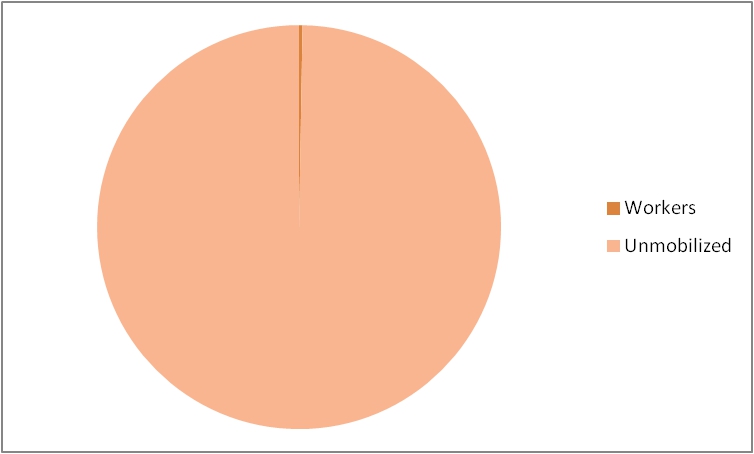What army would leave the vast majority of its soldiers in the barracks while going into battle? In one sense, that’s exactly what the church has done. We have gone to war with only a fraction of our soldiers mobilized. We’ve relegated the work of discipling the nations to pastors, missionaries, and other “career” Christians.
The result? A tiny slice of kingdom workers to do the work of all. Consider these statistics.[1]

- About 2.18 billion Christians in the world
- Total Christian workers (pastors and missionaries) are estimated to be 5.9 million
The resulting ratio is pictured in the pie chart. A better illustration of “a picture tells a thousand words” would be hard to find.
All that to introduce you to something we recently became aware of: the Theology of Work Project.
What if you really believed in changing the world? Where would you start? That question prods people of conscience in any culture; and Christians are no exception. Now, perhaps for the first time in human history, technology, worker interest and scholarly expertise have merged to make possible the exploration and recording of a comprehensive body—a theology—of Scripture’s timeless truths and the timely application of those truths into working cultures everywhere. Following the path first laid out by the field of missions and missionary endeavors in the Lausanne Covenant, we begin this journey with an earnest desire to expand our knowledge of how God would have us do our daily tasks. We invite you to join us on this trek.
If the “army” metaphor isn’t obvious there, consider this: the ultimate goal of the Theology of Work Project is “to help workers perceive God’s purpose, meaning, and value in their work, and to bring Christ’s redeeming power into the fabric of their workplaces.”
Our readers who are familiar with Darrow Miller’s work will immediately recognize the synch between the Theology of Work Project and Darrow’s book, LifeWork: A Biblical Theology for What You Do Every Day.
The project has brought together scholars and workplace practitioners to “build consensus around fundamental truths contained in a Theology of Work consistent with orthodox historical Christianity.” The group plans to examine every book of the Bible for its content about work. They have published papers (available online here) on well over half the Bible’s books already.
Kudos to this effort. May their impact for the kingdom be deep and wide.
– Gary Brumbelow
[1] From Answers.com. The accuracy of the actual numbers may be open to question, but the gist of what they convey is probably undisputed.






4 Comments
Jon
March 18, 2013 - 10:15 pmGood Stuff!
admin
March 21, 2013 - 11:14 amThanks, Jon.
Gary Brumbelow
Gary Zander
March 19, 2013 - 7:12 amI agree that many more Christians need to actively get into the harvest. But I wonder whether using the full-time ministry (pastors, missionaries, etc.) statistic you quoted further supports the view of the division of Christian workers into clergy and laity. Your point is well-taken but the statistic does not support your point. It would be more helpful to know how many Christians are actively involved in Kingdom work – whether paid or unpaid.
admin
March 21, 2013 - 11:14 amGary,
Thanks for your comment, and for reading. You raise a valid point: there are many people serving the kingdom who are not in a “career ministry,” so to speak.
I was trying to say something parallel to your observation. I was trying to offer a critique of the view, held by many Christians today, that only pastors and missionaries are in the harvest. I do not mean to perpetuate the artificial clergy-laity distinction.
Thanks for your helpful clarification.
Gary Brumbelow